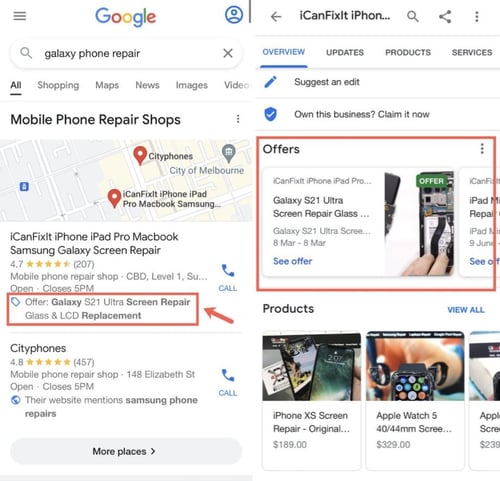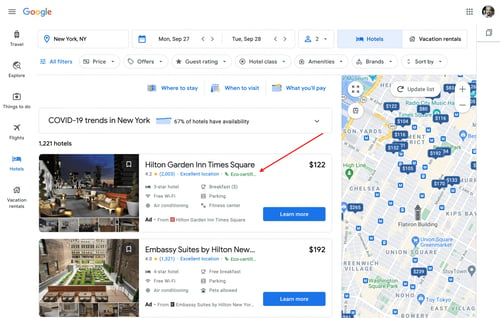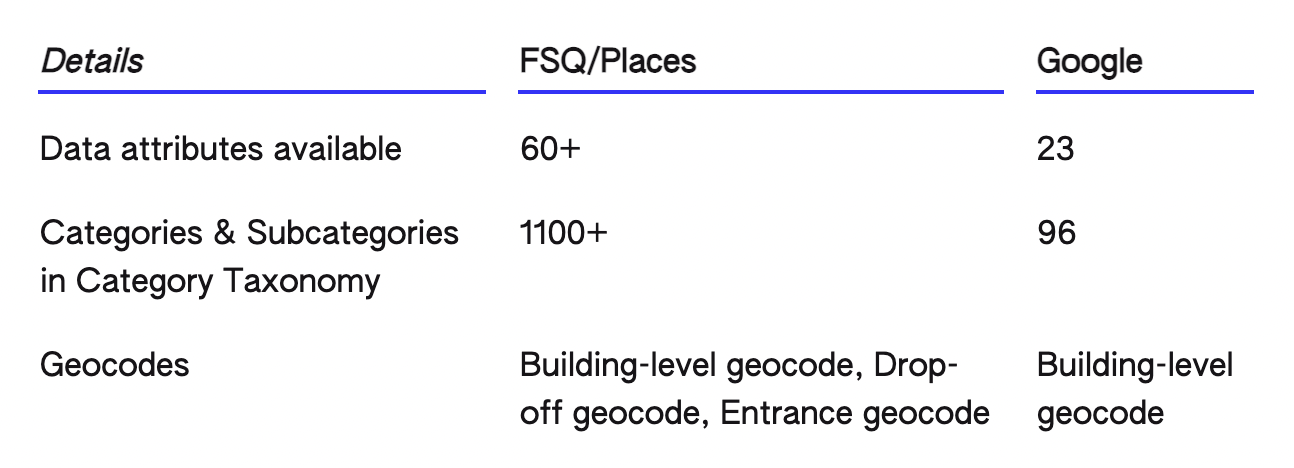Damian Rollison | Oct 4, 2021 8:47:46 AM
6 Min Read
Due to the acquisition of Brandify by SOCi, we will be sunsetting the Brandify Monday Memo. Going forward, you will be able to access the same great content on the SOCi blog under a new name: The Local Memo. Click here to read this week’s edition on the SOCi blog.
In this week’s update, learn about offer post justifications in local results; eco-certified badges for hotels; Yelp’s new Guest Manager tool and virtual restaurant attribute; a blueprint for local landing pages; the expansion of Google Lens and a new “in stock” filter for retail; and a new autocomplete feature in the Foursquare API.
Glenn Gabe has shared some screenshots on Twitter of yet another type of justification appearing in Google local pack results. These are justifications related to offer posts, identified with a special sales tag icon and the word “Offer” preceding text quoted from the post content, with terms matching the search query called out in boldface.
As you may be aware, justifications are an increasingly important part of the content shown to searchers when local pack results are displayed. Though some justification types, such as “Their website mentions,” have been around for a couple of years, Google in recent months has been adding to the list and pulling relevant content from more places in the Google My Business profile as well as external sources, like the Merchant Center for product inventory and the Google user community for “Sold here” justifications. Posts were already a justification type, so it’s interesting to see Google experimenting here with a special callout that is specific to offer posts. It remains to be seen whether this justification type will be rolled out more broadly.

Offer post justification, courtesy Glenn Gabe
Google has begun to display an “eco-certified” badge for select hotel listings, after announcing in July that the company was sourcing sustainability attributions and eco certification information from hotels directly. There are numerous independent organizations that confer eco certifications for hotels, such as Green Key and EarthCheck; certification from any such recognized organization can cause the eco-certified badge to display. The About tab for any hotel profile lists the full range of information about that hotel’s specific certifications, as well as sustainability practices under headings like water conservation, sustainable sourcing, energy efficiency, and waste reduction. These attributes can be configured in the Google My Business dashboard.

Eco-certified badge in hotel profile, courtesy Search Engine Roundtable
Yelp has upgraded its Yelp for Restaurants product with the launch of a new, comprehensive front-of-house management system called Guest Manager. Guest Manager combines together the functionality of several previously independent Yelp products, including Waitlist, Reservations, Kiosk, Takeout, Table Management, and more. With Reservations and Waitlist, diners can make reservations or place themselves on a waitlist to be seated while still at home, via the restaurant’s Yelp page or website. Kiosk lets diners check into a waitlist upon arrival, and Takeout helps restaurants accept and manage takeout orders, texting diners when orders are ready. Yelp has also integrated Guest Manager with loyalty platform Punchh and digital ordering platform Olo. Finally, Yelp has released a new virtual restaurant attribute to identify restaurants that are only open for pickup or delivery.
Yelp notes that, even while facing a labor shortage, the restaurant business is booming, with more diners seated by Yelp in August than in the same period before the pandemic in 2019, and 77% more searches for takeout compared to the same previous period.
Carrie Hill has a new, extensive post on the BrightLocal blog offering guidelines for building out effective local landing pages. Her advice is pitched to small to mid-sized businesses but a fair amount of it applies to larger multi-location businesses as well. Her process begins with keyword research, in particular identifying the search terms that align best with the kind of business you want your pages to help generate. Effective pages should include mentions of your brand, the location’s address and contact information, an embedded map, and at least one unique (non-stock) local image representing your business or the work you do. Hill offers several tips for differentiated landing page content: tell potential clients what sets your business apart; share reviews from customers; offer price range information; mention any guarantees; introduce the members of your team; answer any questions your customers frequently ask. She also covers HTML basics, and recommends breaking up paragraphs into bullet lists or informational graphics for better readability. Finally, always test your work, and don’t assume a tactic will work until tests have proven it. Hill includes a section on common landing page myths and lots of other useful content.
In a recent blog post, Google announced it would be introducing new applications of the Google Lens visual search tool in the near future, including a button in the Google app for iOS that makes all the images on a given web page instantly searchable, and an integration with the Chrome browser that lets users invoke Lens from any page in order to see image search results for page content. In part, the intent is to make it easier to use Lens as a shopping interface: when you see a picture of something you’d like to buy, you can use Lens to instantly find stores with matching products.
Shopping convenience is also the intent behind a new “In Stock” filter Google has added to local search results for retail. When searching for a specific product on Google, users will be able to click the “In Stock” filter button to find local stores who list the item in their current inventory, as determined by inventory feed information sourced via See What’s in Store or the Merchant Center.

The “In stock” filter in action, courtesy Google
Foursquare has announced that its Places API will now autosuggest businesses as users type into a search box. This new autofill functionality can suggest not only matching businesses but also addresses, cities, and neighborhoods, and can provide matching results despite user mistakes such as spelling errors or missing words. Foursquare offers developers a location database with 100 million global points of interest, powered by users of its consumer apps as well as data partners like SOCi. Platforms using Foursquare location data include Uber, Samsung, and, according to the company, “thousands of individual developers and start-ups.” Foursquare is positioning itself as a cost-effective alternative to Google for location data at scale with a number of advantages as indicated in the table below.

How the Foursquare Places API stacks up against Google, courtesy Foursquare
Topics: Local Memo

VP of Market Development and Strategic Partnerships
Offer Post Justifications Spotted in Local Results
Oct 4, 2021 8:47:46 AM
Monday Memo: More than Brands and Influencers, Consumers Trust Each Other
Sep 27, 2021 7:56:34 AM
Monday Memo: Google Adds “Latino-Owned” to GMB Identity Attributes
Sep 20, 2021 7:58:58 AM
Monday Memo: New Study Shows 94% of Consumers Use Online Business Directories
Sep 13, 2021 7:16:55 AM
Monday Memo: The Page Experience Update Has Fully Rolled Out
Sep 6, 2021 7:43:45 AM